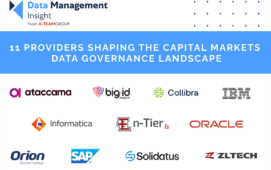The business benefits of investment in data management projects should be obvious in terms of improving efficiency and saving costs, said Ian Webster, global head of data management at UBS Asset Management to attendees at FIMA’s focus day in London. If there are no definitive practical benefits that can be explained to the business, then there is no point in going ahead with such a project, he contended: “After all, we are in the business of generating revenue.”
Before any technology investment is made, firms must first ensure they understand the problem they are trying to solve, cautioned Webster. “Technology is no solution on its own and can, in fact, cause more problems if the underlying business requirements are not being met,” he said.
Webster indicated that technology, semantics and data standards should be seen as enablers to solve business challenges. “The vast majority of issues are related to business processes rather than technology and these must be tackled before any technology investment can be made. Unless you define the business rules and the problems first, the effort is useless.”
He pointed to the IT silo mentality, where the IT department is divorced from the business as a key challenge going forward. “All parties need to be at the same table in order to come up with a workable solution for the business overall. IT has a part to play by bringing in ideas about innovative new ways to tackle business challenges,” he said. “The business also needs to be able to question the decisions being made around technology.”
Webster suggested that in the future, this collaboration would be much more easily achieved, as future generations are much more technologically savvy and could therefore work in a more integrated fashion. Monolithic IT departments could potentially be a thing of the past.
For now, data management projects need to be targeted and quickly rolled out, so that the industry is not constantly solving “yesterday’s problem”, said Webster. This means that governance of data management projects is key, so that they are being run at the correct level, whether that is department level or firm-wide. This is a theme that Webster has often elaborated upon at FIMA.
“A central utility is not appropriate to solve all problems,” he added “We need to do things that make the business better, quicker and cheaper.”
Webster’s comments are also certainly nothing new to the industry, as many firms have indicated that the appetite for large scale EDM projects is minimal in the current environment of intense cost pressure and regulatory focused spending. Just look at the changing approaches of the EDM vendors out there for proof; with many offering much more targeted solutions (look at GoldenSource’s recent RiskHub launch).
Subscribe to our newsletter




